Sahiyo talks about female genital cutting at 3rd Annual Intersections of Violence conference
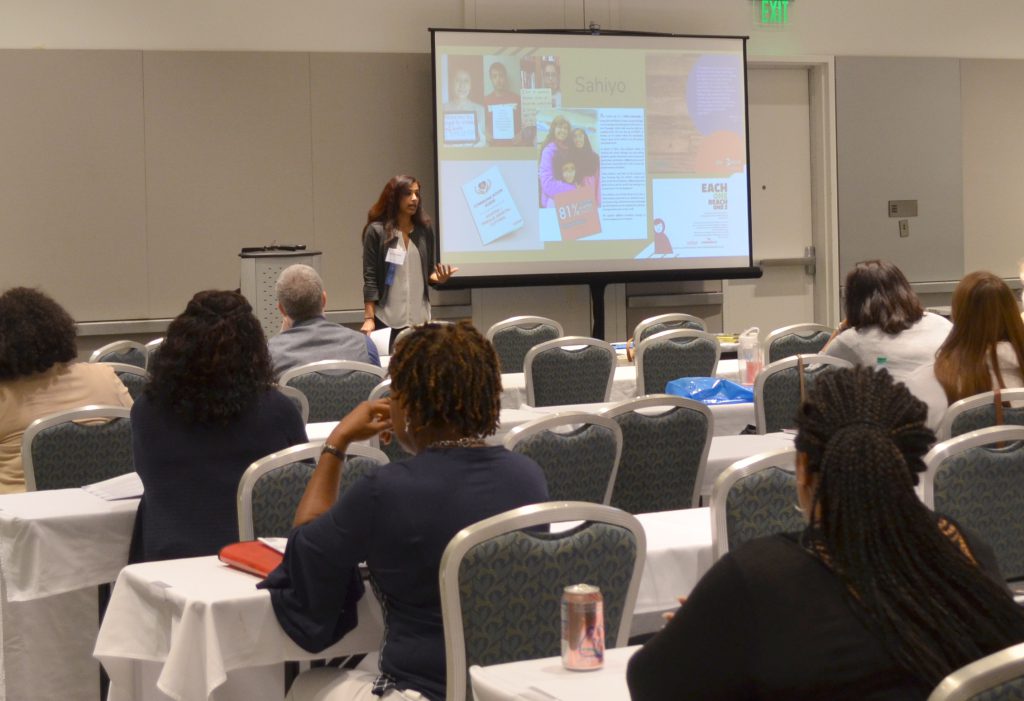
On July 16th, Sahiyo Cofounder and U.S. Executive Director, Mariya Taher was invited to attend the 3rd Annual Intersections of Violence: Domestic Violence, Sexual Assault, and Child Abuse Conference in Hampton, VA and host a break-out session on female genital cutting (FGC) in the United States. The conference is dedicated to enhancing the effectiveness of victims service professionals and brought together law enforcement, prosecutors, victim advocates, child advocates, and other allied professionals to highlight promising practices and emerging issues to effectively respond to domestic violence, sexual assault, andchild abuse in our communities. Mariya’s presentation, the only one of its kind at the conference, covered an overview of who is affected by FGC, interventions used to address FGC, and how to work/respond to survivors. Most attendees had little experience with FGC and so throughout the presentation, survivor stories, from Sahiyo Stories project were shown to participants to help contextualize that FGC was an issue within the U.S. affecting women of all different backgrounds, including religion, ethnicity, socio-economic status, education level, citizenship status, etc.
PRESS RELEASE: A pioneering Roundtable to Address Female Genital Mutilation/Cutting in Massachusetts
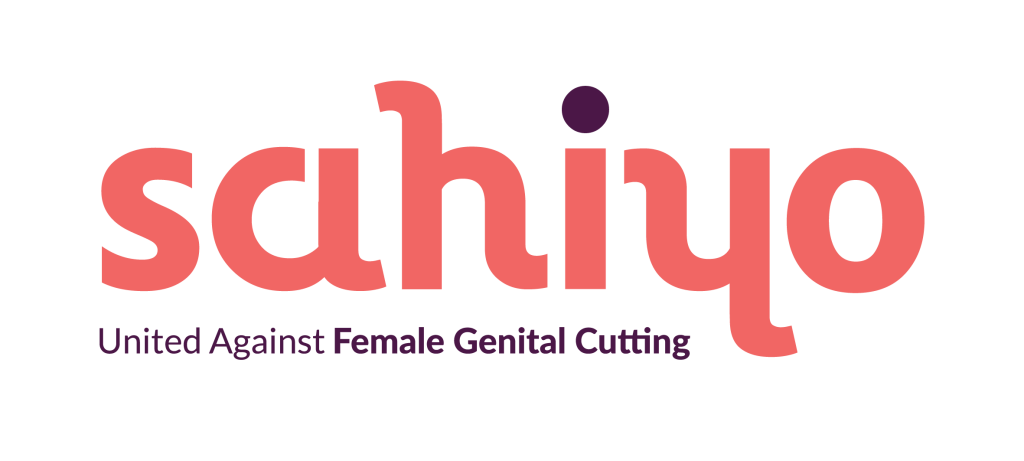
Download press release as PDF PRESS RELEASE: A pioneering Roundtable to Address Female Genital Mutilation/Cutting in Massachusetts Boston, Massachusetts, 14 June 2019 On June 13, 2019, a collective of almost 60 experts from different disciplines and cultural groups took the first steps to create a ‘Massachusetts End FGM/C Network’, to highlight the largely unrecognized global issue of Female Genital Mutilation/Cutting, and to share knowledge and resources to help end the practice. The experts gathered to attend the first of its kind roundtable to address FGM/C in the state of Massachusetts. They included community leaders, civic society organizations, health professionals, state government officials from the Massachusetts Legislature, and the Massachusetts Office of the Child Advocate, and federal government officials from the Department of Justice, and Department of Homeland Security Investigations. The event was organized and led by Sahiyo, a storytelling organization working to support survivors of FGM/C, with support from co-sponsors Muslim American Leadership Alliance (MALA), Tostan, MassNOW, Lesley University, the US End FGM/C Network, and the Women’s Bar Association of Massachusetts. A prevalence study conducted by the Center for Disease Control (CDC) and Prevention reveals that in 2012, over half of a million women and girls in the United States had FGM/C performed on them or were at risk of FGM/C. Massachusetts ranks 12th in the nation for at-risk populations, totalling 14,591, with the largest at-risk metro areas being Boston, Newton, and Cambridge. “I’ve undergone FGM/C and I know FGM/C is a global issue affecting women of all different ethnicities, religions, cultures, socio-economic status, and more,” said Mariya Taher, Sahiyo Cofounder and U.S. Executive Director. We need a global response to ensure future girls do not undergo it. We need to think globally and act locally.” “All are about the cultural control of women’s bodies,” s aid Representative Jay Livingstone in reference to FGM/C. Livingstone is a former prosecutor and co-lead sponsor of the Massachusetts FGM/C criminal bill – H. 3332 who connected the dots between this recent bill to Massachusett’s Equal Pay Act and other pending state legislation, such as The Roe Act. Rep. Livingstone expressed his hope that the FGM/C had bi-partisian support during this legislative session and would pass this session. Dr. Melody Eckhart, an OB/GYN at Massachusetts General Hospital, and Dr. Sondra Crosby, an internist at Boston Medical Center, spoke about their experiences working with patients who have undergone FGM/C and physical complications that can result, including shock, pain, hemorrhage, infection, and anemia. They warned of the long-term consequences of scar tissue and cyst formation impeding proper urination and menstruation, sexual dysfunction, and complicated labor and delivery, as well as fetal demise. They also called on the urgent need for educating health professionals on how to care for survivors — including addressing their psychological and emotional needs. “FGM/C is shrouded in secrecy even in the medical community,” said Dr. Crosby. “Health professionals need training in how to work with women in non-judgemental ways, how to make referrals, and how to treat the medical and psychological consequences of FGM/C, such as post-traumatic stress disorder and depression. Medical personnel need to understand the women’s FGM/C experience before they could diagnose and treat it.” The roundtable was a vital first step to create a multi-disciplinary working group that works to protect all girls in Massachusetts from experiencing this form of gender-based violence. For more information, contact Lara Kingstone at communications@sahiyo.com
Multiple events on female genital cutting hosted at Women Deliver in Vancouver
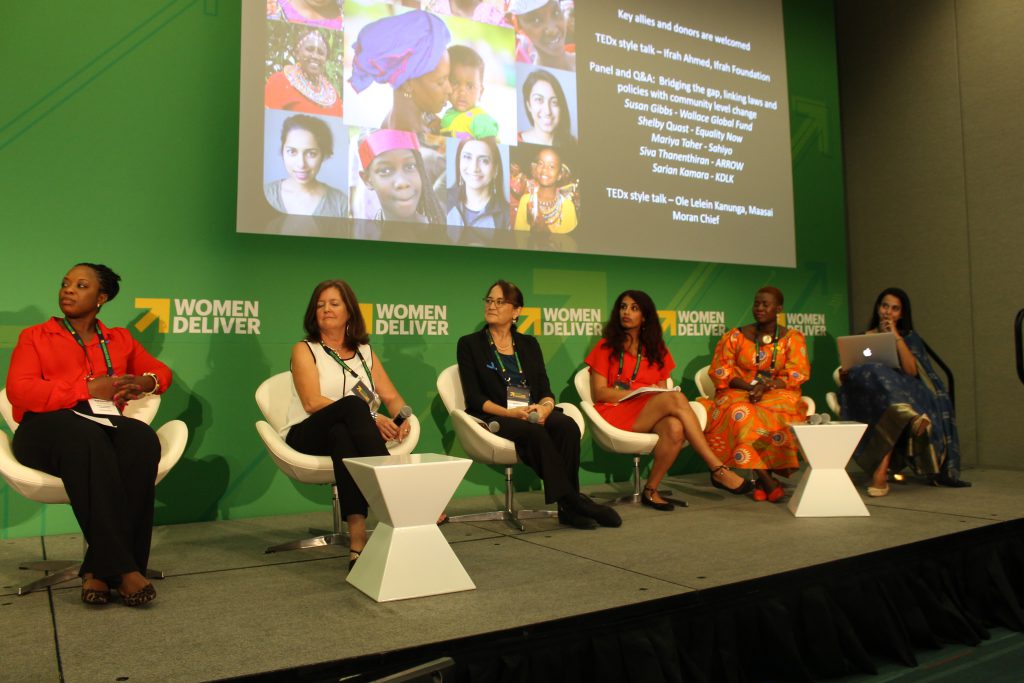
From June 2 to June 6th, Sahiyo co-founder, Mariya Taher took part in Women Deliver 2019 held in Vancouver, Canada this year. Over 8,000 participants took part in the conference and for the first time ever, a pre-conference on Female Genital Cutting was held on June 2nd, a day before the official start of the Women Deliver Conference. The preconference, “Uniting Forces to Ensure Female Genital Mutilation/Cutting (FGM/C) is a Practice of the Past” was an unprecedented event from civil society for civil society to unite voices and come together around a global Call to Action to end FGM/C and support FGM/C survivors. The event convened civil society organizations, champions, survivors and other grassroots representatives from across the globe to come together as a sector, to get to know others working globally across this issue, and to discuss what is needed to accelerate ending FGM/C by 2030. A global call to action was created out of the preconference by the participants in attendance, which was referenced throughout the entire duration of the conference and the various side-events on FGM/C held from June 3rd to June 6th. Other side events in which Sahiyo took part in as a panelist or speaker included: A screening of ‘In The Name of Your Daughter’ with a panel discussion afterwards entitled ‘FGM and the West — Is it our issue too?’ ‘It takes a whole community: Ending female genital cutting within a generation’ – hosted by Orchid project, this event was a highly participatory, activist-led, interactive workshop on community-based approaches to ending female genital cutting (FGC) within a generation. Featuring grassroots and civil society activists from East and West Africa, Asia, and North America, this session shined a light on effective community-led strategies to shift social norms and end FGC. ‘Ending FGM by 2030: It’s a global issue’ hosted by Equality Now. With a little over a decade before the 2030 target to end FGC, this interactive panel session and audience Q&A explored two vital challenges/themes/hurdles our international community must address to achieve to protect every woman and girl from FGC: 1) How do we measure, invest and support each of the 193 countries who have committed to end FGM, including especially in Asia Pacific, the Middle-East, the Americas, Europe and Eurasia? 2) How can activists, CSOs, intergovernmental bodies, and funders move forward as one to hold States, International and regional bodies and donors to account to end FGM globally by 2030? To learn more about Women Deliver and impact of the Preconference and side-events, check out related media coverage: World leaders urged to make female circumcision a priority like HIV Activist push for end to female genital mutilation and call for Asia Network Sierra Leone’s first lady confronted over FGM controversy Further Sahiyo Blog Posts on Women Deliver: Joint Press Release: ENDING FGM/C BY 2030: Uniting forces to make FGM/C a practice of the past Global Call to Action From “Uniting forces to make female genital mutilation/cutting a practice of the past: A gathering for global civil society actors”
Sahiyo Stories Shown at Reconference In Nepal
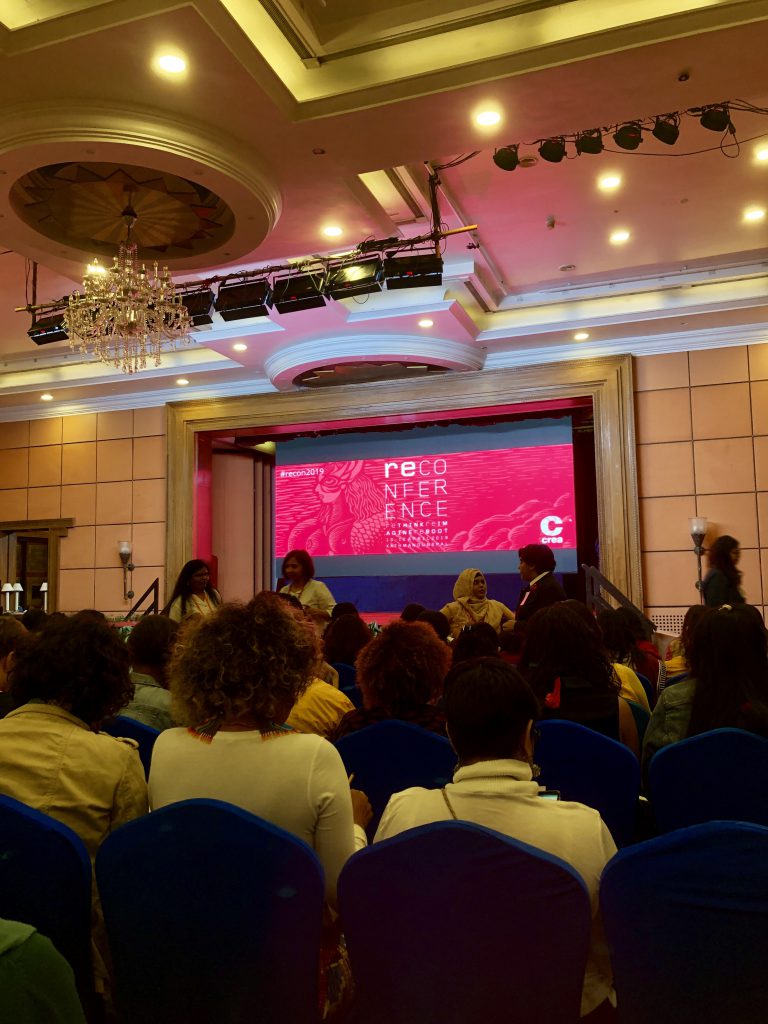
From April 10 to 12, Sahiyo co-founder Mariya Taher attended Reconference, a three-day conference hosted by CREA, to address today’s most challenging socio-political issues and their intersections with feminism, art, and technology by rethinking, reimagining, and rebooting how to build an inclusive feminist vision of justice. Sahiyo Stories, a digital storytelling project organized and created by Sahiyo and StoryCenter, was selected to be part of Day 2 of Reconference, and Mariya presented the collection of 10 digital stories created by women living in the US who had undergone female genital cutting (FGC) or had family members who had undergone it, in order to highlight that FGC is a global issue affecting women of all different backgrounds. Her workshop was the only one highlighting FGC at the three-day conference.
Joint Press Release: ENDING FGM/C BY 2030: Uniting forces to make FGM/C a practice of the past

Download Press Release as PDF JOINT PRESS RELEASE: ENDING FGM/C BY 2030: Uniting forces to make FGM/C a practice of the past 2nd June 2019, Vancouver (Canada) 3.9 million girls are at risk of female genital mutilation/cutting (FGM/C) every year. On the 2nd June 2019, for the first time ever, NGOs, grassroots and survivor-led organizations from around the world came together at the Women Deliver conference around a common goal: to end FGM/C by 2030 and to support survivors of the practice. This is our Call to Action. FGM/C is happening on every continent except Antarctica: it is a global issue that needs a global response, which is why we have come together – across Asia, Africa, Europe and North America – to build a unified platform for action. Together, we represent no less than 38 countries from all regions of the world. The time has come to make FGM/C a global priority, in the same way the community responded to urgent global epidemics, such as HIV/AIDs. FGM/C is a violation of the human rights of women and girls and must be ended in all its forms. Whole communities must be mobilised and empowered at the grassroots level if we are to end FGM/C – women and girls, men and boys, traditional and religious leaders, health workers, law and policy makers. During the opening plenary of the Women Deliver conference, His Excellency Uhuru Kenyatta, President of Kenya, committed to end FGM/C in Kenya by 2022. We welcome this and call on all global leaders at the conference, and beyond, to commit to end FGM/C. To put an end to the harmful practice of FGM/C, we will work in partnership with each other, all communities, governments, donors, multilateral bodies and others to end the practice by 2030 in line with the Sustainable Development Goals (SDGs) determined by the UN. Together, we will challenge the social and gender norms by addressing the root causes of gender inequality at the community level, including gender stereotypes, unequal power relations, and negative social norms. Because this is what holds the continuation of FGM/C in place: control of the female body, of women’s sexuality and of their freedom to decide for themselves. We must also acknowledge our current failure in providing adequate support systems for FGM/C survivors. We need to provide security and protection, targeted research and resources to enable health and emotional wellbeing as well as post-trauma support. We also need to better understand and respond effectively to adaptations to the practice which continue to violate women’s rights, such as medicalization, cross-border practices, and lowering the age at which FGM/C is carried out. Investment is needed in increased and better research into what is working, and what is not working, to end FGM/C. Funds should be more flexible, sustainable and accessible for communities. We need an integrated, intersectional approach to ending FGM/C, recognising the connections with other forms of gender-based violence and linking with existing movements. We are focused on coming together and working collaboratively to address what existing gaps there are, making sure that FGM/C is a practice of the past. Signatories: Amref Health Africa COVAW End FGM Canada Network End FGM European Network Equality Now Orchid Project Sahiyo The Girl Generation There Is No Limit Foundation The Inter-African Committee on Traditional Practices Tostan US End FGM/C Network What is FGM/C? It is estimated that 3.9 million girls and women underwent the practice of female genital mutilation/cutting (FGM/C) in 2015 alone (source: UNFPA). FGM/C comprises all procedures that involve partial or total removal of the external female genitalia, or other injury to the female genital organs for non-medical reasons. FGM/C is recognized internationally as a violation of the human rights of girls and women. It reflects deep-rooted inequality between the sexes and constitutes an extreme form of discrimination against women. It is nearly always carried out on minors and is a violation of the rights of children. The practice also violates a person’s rights to health, security and physical integrity, the right to be free from torture and cruelty, inhuman or degrading treatment, and the right to life when the procedure results in death. Further Women Deliver blog posts: Multiple events on FGC hosted at Women Deliver in Vancouver Global Call to Action From “Uniting forces to make female genital mutilation/cutting a practice of the past: A gathering for global civil society actors”
Sahiyo Stories screened in Massachusetts
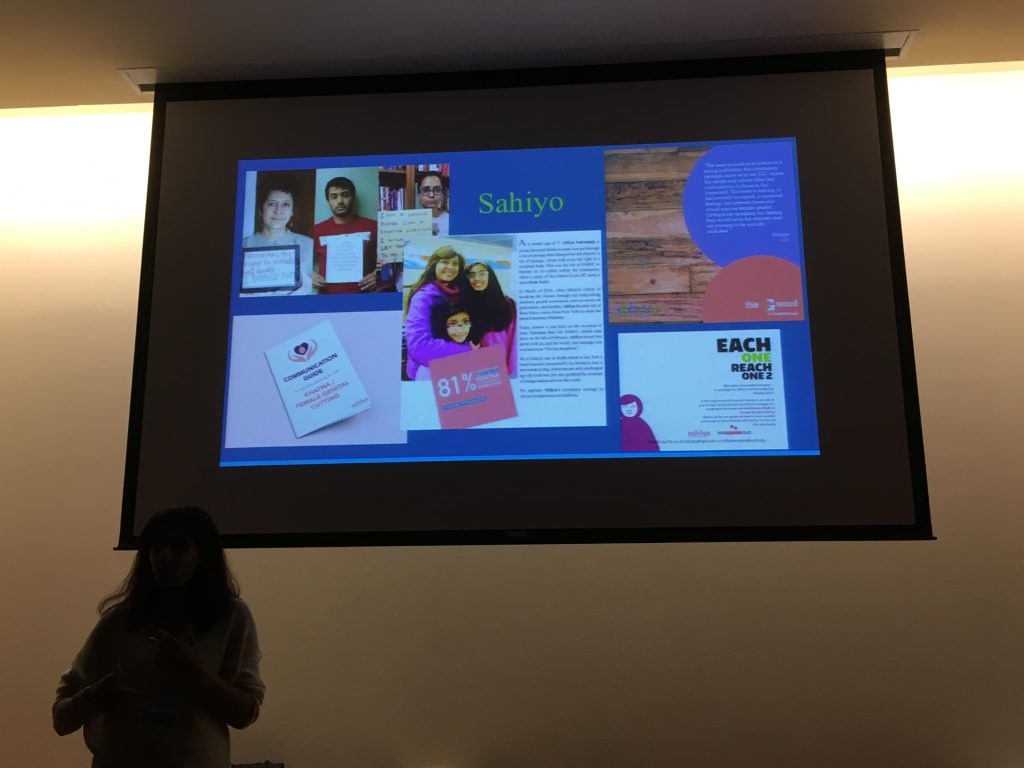
In May 2018, the Sahiyo Stories project brought together nine women from across the United States to create personalized digital stories that narrate the experience of undergoing female genital mutilation/cutting (FGM/C) and/or the experience of their advocacy work to end this form of gender violence. The video stories created at the workshop have since then been released on YouTube (you can watch them here). In November a public screening of Sahiyo Stories was held in Massachusetts. Lesley University, Massachusetts On November 9th, Sahiyo took part in Violence Against Women Conference hosted by Lesley University. This day-long, interdisciplinary event aimed to “provide a platform for scholars, artists and community activists to explore the interplay between global representations of violence against women and historical and contemporary discourses.” Sahiyo held a screening of the Sahiyo Stories digital stories, with an introduction on ‘What is Female Genital Cutting’ by Sahiyo co-founder Mariya Taher, and a post-viewing Questions & Answers session with Renee Bergstrom, one of the Sahiyo story participants. At the Lesley University screening, the audience included a mixture of folks, with a majority of the participants being Lesley students interested in gender equity, human rights, international women’s issues or a unique cross of these fields. Here’s what Lara Kingstone, Sahiyo’s Communication Assistant had to say about the event: The Q&A session allowed for followed was a frank and informative discussion of FGC, social change, and the nature of community traditions. Having both Mariya and Renee present added a layer of personal connection to the screening, and I believe that guests and facilitators alike (and myself, the Communications Assistant!) came away feeling energized, informed and connected by the session. ~ Lara
Aarefa Johari and Masooma Ranalvi discuss FGC at We the Women Bangalore

On October 7, Sahiyo co-founder Aarefa Johari and We Speak Out founder Masooma Ranalvi participated in a panel discussion on Female Genital Cutting in India, at the We the Women summit organised by veteran journalist Barkha Dutt in Bangalore. Prominent human rights activist Srilatha Batliwala moderated the discussion. The event was attended by more than 200 people in Bangalore and was streamed live on social media. Ranalvi and Johari shared their personal experiences of being subjected to FGC and discussed various aspects of the problem from the need to engage with the community to end the practice and the significance of a law against it. You can watch the complete video of the discussion here. The event was a follow up to a similar We the Women summit in Mumbai in December 2017, when Sahiyo co-founder Insia Dariwala spoke about the practice along with Mubaraka and Zohra, two survivors of FGC. You can watch last year’s video here.
Penn State Law School Host Conference on Female Genital Cutting

On April 12-13th, the Dickinson Law’s FGM Legislation Project hosted a conference, “Crafting Legislative and Medical Solutions to Address Female Genital Mutilation Locally and Internationally,” at Dickinson Law. This conference aimed to educate the public, lawyers and medical professionals about the legal, social, psychological and medical consequences of FGC. Experts and practitioners gathered to address the medical implications for women who have undergone it, the need for legislative action, and cultural competencies and prevention. Sahiyo Cofounder, Mariya Taher participated in a panel session, “Effective FGM Prevention and Survivor Advocacy.” A live stream of the event can be found here. On April 13th, a working group gathered to create and discuss an optional protocol to the Convention on the elimination of all forms of discrimination against women that focuses primarily on Female Genital Cutting.
I Said It Loudly: I am an FGM Survivor. Meeting FGM Survivors for the First Time Was My Cursed Blessing
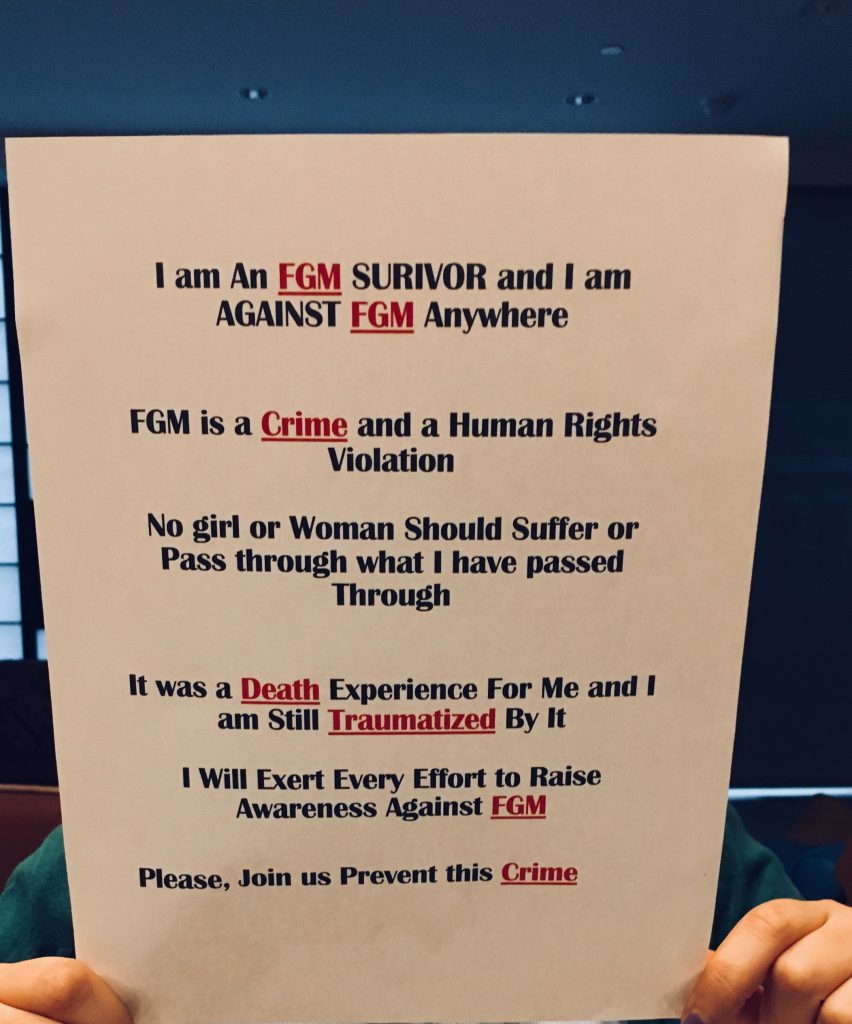
(Note: The following blog was written by a survivor who attended a meeting, the topic of which was on mental health and FGC. Her story highlights the power of storytelling and how it helps break the isolation that many survivors experience in having undergone FGC and dealing with their trauma afterwards, an isolation that Sahiyo is attempting to break via the storytelling work we engage in with communities.) By Anonymous Country: Egypt & United States Even now, despite my brain trying to convince me it was a good idea to attend a conference on FGM and Mental Health, I cannot emotionally explain what really happened that day. The conference consisted of FGM survivors, human rights advocates, therapists, and policymakers, and almost two weeks after having attended, I started to have stronger flashbacks of the terrible experience I underwent with FGM in my home country, Egypt. I have mixed feelings of love, support, and pain for having attended that conference. My journey dealing with that horrible experience started in my home country where my rights as a human being were violated without my consent. I was bleeding and almost died having been operated upon twice. Even now, I cannot easily write these words. You may wish to read my full story published here. The experience of meeting with other survivors from India and other countries was something I strongly needed to help bring me face to face with the many answers to the many questions in my mind regarding why I experienced so much anxiety, sadness, depression, panic, and fear after my cutting. I wanted to know how other survivors had dealt with their FGM especially those who spoke up about it publicly, such as (Mariya Taher, Leyla Hussien, Jaha Dukureh , Naima Abdulhadi, and others) ; I am relatively new to openly talking about it and I still feel as if I am climbing a mountain when trying to share or speak about it. I heard these women saying how it was and is still difficult; and listening to them has helped me to feel that I am not alone in my experience. I saw how powerful the pain of this experience can be, but at the same time was inspired by the courage of what they and I were determined to do. To speak up about FGM openly and to try to prevent it from happening to other girls. That meeting was the first time I met with and spoke to other survivors from different countries, such as the United Kingdom, Gambia, India, not to mention the United States. At the time, I felt happy that this meeting could serve as a comfort zone for me, knowing others understood what I had gone through. Seeing all those women in that room encouraged me to say amongst the group of almost forty members that I too am a FGM SURVIVOR. I knew these women would not shame me and I did not need to fear being labeled, judged, or threatened for publicly admitting I was a survivor. My heart was beating and my breath was short as if I had climbed a mountain. I thought I was ok during the 8-hour meeting, yet I collapsed and burst into tears at the end; I cannot precisely tell you why, but I thought about how it is unfair that our bodies and souls are violated with this harmful crime. Most of the time I feel sad that I had to go through these painful thoughts, feelings, or flashback of the operation room and after. It feels like I am being retraumatized when something happens to trigger the original trauma of FGM. I beg every mom and dad to see their daughters as beautiful souls who do not need to be cut to be pure. I am Muslim, and I can say it strongly, clearly, and angrily: Do not make it religious because it is not. My body was not supposed to be violated in this severe way nor was my soul. Yet, both happened. But I am comforted in knowing that there are others who I can talk to who understand my pain. FGM is a crime and more work needs to be done with healthcare professionals, as well as policy makers. Girls must be protected from being cut and survivors should be supported with the needed assistance to help them heal.
DC Meeting- Expert Consultation on FGC and Mental Health

On Feb 27th, Sahiyo’s Mariya Taher attended a roundtable discussion in DC on FGC and Mental Health hosted by the Wallace Global Fund and the International Center for Research on Women (ICRW) Although the global development community has increasingly acknowledged the adverse physical health complications that can result from FGC, there has been little action to address its psychological impact. The roundtable served as a first step to bring together experts from bilateral and multilateral agencies, donor institutions, academia, policy-makers, civil society and program implementing organizations in the United States to gain a better understanding of FGC and mental health, as well as to drive a collaborative, coordinated and appropriately sized response across the globe. Throughout the day, the panelists and attendees discussed the short and long-term mental health of survivors and activists who engage additional barriers when advocating to end FGC. In addition, dialogue about research needs, support programs, and prevention in connection with mental health occurred. Mariya served on a panel to discuss the findings of Sahiyo’s Needs Assessment. Sahiyo had recently partnered with a healthcare market research consultancy to conduct primary market research with activists speaking out against FGC, in an effort to better understand activists’ challenges and hopes for the future.To learn more about this research, visit Sahiyo’s website.
